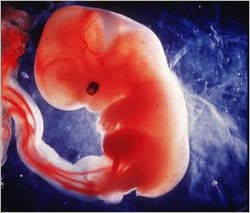New hope in overcoming Down syndrome
Down syndrome can be treated right away when the baby is still in the womb. A pregnant woman who knows her baby is about to be born at risk of Down syndrome may one day avoid it before birth.
 At least until this point that hope has been tested on mice. The pups that are still in the fetus have symptoms similar to Down syndrome when treated with neuroprotective chemicals, some of the adverse factors that cause the disease seem to have been remove completely.
At least until this point that hope has been tested on mice. The pups that are still in the fetus have symptoms similar to Down syndrome when treated with neuroprotective chemicals, some of the adverse factors that cause the disease seem to have been remove completely.
We all know that children with Down syndrome have errors in the 21st chromosome pair, while in rats there is similarity in the 16th chromosome pair. Down syndrome makes energy and intellectual underdevelopment. Individuals with three pairs of chromosomes may lose their ability to absorb and later develop Alzheimer's syndrome.
Preventing movement in the GABA nervous system in mice with three adaptive chromosomes can improve cognitive ability. This is applicable to children before being born to improve their cognitive abilities.
Previous studies conducted on both Down and mice with three corresponding chromosomes have also revealed problems in cells - brain cells regulate the development of the nervous system by development. Good protein substances. Defective cells produce less protein than usual. By adding small pieces of some of these proteins, such as NAP and SAL to children at risk of birth, will help protect the nervous system better.
Catherine Spong and colleagues at the National Institutes of Health at Bethesda Maryland injected mice with pregnant NAP and Sal in between the months of pregnancy. When the baby mice were born, they studied their development process. They found that mice thought to have Down syndrome when treated in their womb had actions, thoughts and life as normal mice. Spong said: 'This is really a revolution because everyone craves for a normal healthy child.'
The brains of the treated pups also have levels of ADNP - a common protein that produces less infected cells. The study also found that some of the effects of Down syndrome are also lost. Spong hopes that the treatment in the womb can permanently increase protein production.
- The syndrome of 'rubber' is always late, which can be a disease
- New hope in treating Parkinson's
- Gene therapy offers hope for Parkinson's patients
- The disease syndrome makes people special
- Strange fear syndrome that you may be suffering from but don't know how to call
- Decode the 10 most macabre mental diseases that people have
- Detection of Down syndrome when the fetus is only 11 to nearly 14 weeks old
- The truth about human 'unusual' eating syndrome
- What is IBS syndrome?
- Strange diseases
- Strange diseases discovered in the 21st century
- Learn Down syndrome and the truth you should know
 Green tea cleans teeth better than mouthwash?
Green tea cleans teeth better than mouthwash? Death kiss: This is why you should not let anyone kiss your baby's lips
Death kiss: This is why you should not let anyone kiss your baby's lips What is salmonellosis?
What is salmonellosis? Caution should be exercised when using aloe vera through eating and drinking
Caution should be exercised when using aloe vera through eating and drinking